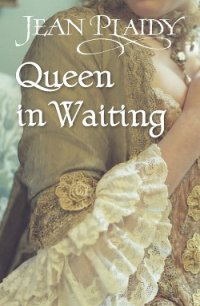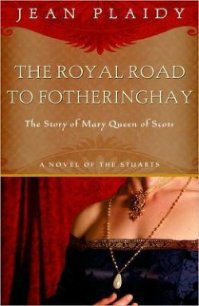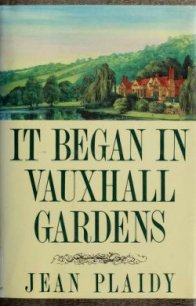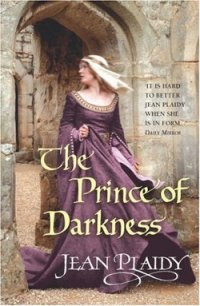Queen of This Realm - Plaidy Jean (читать бесплатно книги без сокращений .txt) 📗
“Know Mr Ashley!” I cried. “That gentleman comes up again and again in your conversation. It is not possible to be much in the company of Mistress Katharine Champernowne without knowing something of Mr Ashley.”
“Then you will readily understand,” retorted Kat. “He has asked me to marry him and I see no reason why I should not.”
“Marry! You!” I must confess the first thought which came to me was, But what of me?
She knew my nature well and she immediately fell to her knees and buried her head in my skirts. “My lady, my dearest Princess, never will I leave you.”
“Not for Mr Ashley?”
“I think Mr Ashley could become a member of your household. I am sure no objection would be raised against that.”
I was dubious. Kat! Married! No longer entirely mine!
People did marry, of course, and Kat was young and comely. But I felt shaken. There was so much change in the air, and I did not want change though I knew it must come. There was too much tension in the air… throughout the Court, throughout the country. I felt it in the streets on those occasions I rode out for I was very sensitive to the mood of the people.
And now Kat was to be married.
Lovingly she assured me that nothing could ever make any difference in her devotion to me. I was her special charge, her Princess, close to her heart, never to be dislodged. She made me feel that she would even abandon Mr Ashley if marrying him meant losing me.
Fortunately she did not have to make such a choice. My good stepmother said that there was a simple solution. Let Mr Ashley join my household. “I feel Thomas Parry is not as efficient as he might be,” she said, “and John Ashley is a very clever young man.”
So our problem was solved and Kat became Kat Ashley. Parry stayed of course but John Ashley became a member of the household; I was very pleased because not only was he Kat's husband but there was a family connection between him and the Boleyns.
We were at Hatfield and I was delighted to be there because Edward was with me. We used to converse in Latin—a language we both loved. I had a secret with which I intended to surprise him. There was a woman in my household, Blanche Parry, a Welshwoman, who was very proud of the fact that she had rocked me in my cradle. She was very fluent in her native language and I suggested she should teach it to me. With my aptitude I was soon able to speak in Welsh with Blanche and I thought it would be rather amusing to let Edward know that I had acquired the Welsh language of which he and the erudite little Jane Grey were ignorant. After all we Tudors had Welsh blood in our veins and royal as we were, we had inherited through our ancestor Owen Tudor.
But before I did this there was disturbing news that my relatives Thomas Howard, Duke of Norfolk, and Henry Howard, his son, Earl of Surrey, had been thrown into the Tower.
Kat, as usual, knew all about it.
“How could Surrey be so stupid?” she demanded. “Do you know what he has done? He has assumed the right to wear the arms of Edward the Confessor. He says the concession was granted to his family by Richard II. Of course the College of Arms forbade this, but what does my Lord Surrey do but ignore them.”
“And do you mean to say that for such an offense Surrey and his father are in the Tower?”
Kat came closer to me and whispered: “It's the Seymours. You wouldn't expect them to miss a chance like this, would you? He has played right into the Seymours' hands. Silly Surrey!”
“Kat,” I said severely, “you forget yourself.”
“So I do,” she replied.
“You should not speak so flippantly of the Earl of Surrey. He is a very great gentleman.”
“He must be if he can sport the royal arms.”
“That was foolish of him.”
“He might have known the Seymours were ready to pounce.”
I was upset. I had felt quite a fondness for Henry Howard. He was a very handsome man but what made him more attractive in my eyes was that he wrote beautiful verses and people said he had me in mind when he wrote them. I always read them avidly and they gave me great pleasure so it was distressing to think of him in that cold dank prison. And his father with him—for the Duke of Norfolk could not be very young. He had once been my mother's chief adviser and although he had presided at her trial and arranged for her execution, he was still a blood relation—my own uncle.
“It is all Seymour now,” said Kat. “My word, how they have come up in the world since their sister married the King. Edward the elder is a sharp one and he has the King's ear. As for Thomas …” Kat smiled knowingly. “Now there is a man. Do you know, I don't think there is another at Court to match him.”
“Match him for what?” I asked.
“For grace… for charm…He is so good-looking…so tall, so commanding. He's much more of a man than his brother. They say there is a little rivalry between Thomas and Edward Seymour. Thomas has no wife—as yet.”
“Kat,” I cried, “since you have discovered the glories of marriage you think of nothing else. Have a care or Mr Ashley will be taking you to task.”
She laughed but I could not join in her merry mood because I was thinking of poor Henry Howard in the Tower where my own mother had lodged before her death.
I was quite fond of Hatfield then, although later I came to regard it as a prison. There was an air of peace about the ivy-covered walls, and Edward kept splendid state in the lofty banqueting hall. When we dined there I always sat beside him and we would talk seriously together, for Edward, who was as aware of the growing tension as I was and far more frightened of it, was becoming very serious indeed.
I heard that the King was at Whitehall, the Duke of Norfolk and the Earl of Surrey still in the Tower, and the Queen in constant attendance upon the King who could not bear her out of his sight these days.
It was December when visitors came to Hatfield. Kat saw the party in the distance and hastened to find me that she might be the first with the news. We went up to one of the turrets to watch the riders approach.
I said: “I'll guess they are coming to tell us we are going to Court and I must warn Edward of their approach.”
“Yes, you two should go down to greet them,” replied Kat.
We had a shock instead of a welcome. Our visitors were guards who had come to escort us—not to Whitehall as we had thought—but Edward to Hertford Castle and me to Enfield. We were to be separated! We protested with horror at being parted but were assured that these were the King's orders and must be obeyed without question.
How different was that Christmas from what I had anticipated! Poor Edward had been so unhappy at our parting and, since he was younger, he was less able to control his grief. I wrote a little note to tell him that I was as unhappy as he was by our forced separation and I was thinking of him all the time. He wrote such a tender letter back. I still have it.
“The change of place, dear sister, does not so much vex me as your departure from me…It is a comfort to my regret that I hope shortly to see you again if no accident intervenes…”
Tragedy intervened. We saw each other, but only briefly.
In January I heard that the Earl of Surrey had been beheaded on Tower Hill. This depressing knowledge did not help me to bear the separation from my brother. Poor reckless Surrey! How prodigal people were of life…in risking it and taking it. It seemed to me such a trivial matter to die for. Oh, but I knew it was more than arms on an escutcheon. It was the deadly rivalry for power between two leading families—the upstart Seymours and the ancient one of Howard. The Seymours were in the ascendant. Of course they were. The Seymour brothers were the uncles of the King to be.
To my great joy Edward was brought to Enfield.
It was the last day of January, cold and frosty, when Edward arrived in the company of Edward Seymour, Earl of Hertford, and Sir Anthony Browne. I was amazed to see these two together in apparent harmony because Sir Anthony was a firm adherent of the Catholic Faith, and Hertford, because of his powerful position in the country, was the man whom followers of the Reformed Faith looked upon to lead them.




